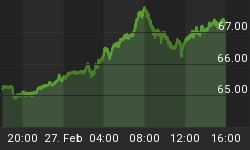Yesterday, as Alan Greenspan warned Congress that the federal budget deficit is unsustainable, he simultaneously encouraged China to stop sustaining it. Since he has failed to forecast so many obvious looming economic problems in the past, such as the return of enormous budget deficits, resurgent inflation, and the real estate, stock, and bond market bubbles, it comes as no surprise that he also fails to realize that America's ability to finance its debt now teeters atop China's foolish currency peg. By encouraging China to remove it, Greenspan needs to be cautioned to be careful what he wishes for, as he just might get it.
In his testimony, Greenspan cautioned that "The federal budget is on an unsustainable path, in which large deficits result in rising interest," which in his opinion "would cause the economy to stagnate or worse" unless the situation were reversed. However, he also commented that "Fixing the renminbi to the dollar is beginning to significantly work to the detriment of the Chinese economy." That in so doing China is "preventing the growth in the terms that would be most valuable for China in the decades ahead."
With respect to floating the renminbi he offered the following advice; "So as far as I'm concerned, it is very much in their interest to move." He even added that "As you can imagine, we in U.S. government have been in conversations with them to indicate that, in our judgment and in our experience, they should be moving sooner rather than later. I have no way of projecting when they will move. That they will move, I am reasonably certain."
Hello, how clueless can one man possible be? By publicly advising China to float its currency, Greenspan is in effect asking the Chinese to do two things; 1) raise the prices that it charges Americans for the goods it sells them, and 2) stop buying hundreds of billions of dollars worth of U.S. Treasury bonds. While such a move would certainly benefit the Chinese, who would earn more for their exports and find more productive uses for their savings, it would clearly have the opposite effect for Americans, who would simultaneously be forced to pay both higher prices and interest rates. Most adversely effected would be the U.S. government itself, which would see the cost of financing its national debt skyrocket at the very moment recession would likely undermine its ability to pay. Talk about putting your head in a noose, throwing the rope over a three limb, and daring your adversary not to pull!
Greenspan is right that the status quo is a bad deal for China. At present, all that China it receives in return for much of its exports to America is inflation. Since America does not supply China with sufficient quantities of real goods in exchange for its exports, the Bank of China must expand its money supply to absorb all the excess dollars for which no American products are available. In the process it also purchases hundreds of billions of dollars worth of U.S. government securities. As a result the Chinese suffer a reduced standard of living, as they are forced to pay higher prices for consumer goods and squander a significant portion of their savings. Americans however, benefit greatly form China's sacrifice by enjoying artificially low consumer prices and interest rates.
If China were to follow Greenspan's advice, the result would be a one-two combination punch right to the chin of the U.S. economy. The left jab: By increases the cost of Chinese imports (and those from other Asian countries whose currencies would like rise along with the Renmimbi) the U.S. inflation rate, as measured by the CPI, would clearly rise, increasing the "inflation premium" required to be paid by the U.S. government on its outstanding debts, the majority of which have extremely short maturities, and thus will have to be re-issued at higher interest rates. Also the prices of non-Asian imports, such as oil, would also likely rise, as wealthier Asians bid them up. The right hook: Since the Chinese government would no longer be buying as many dollars, it would no longer need to buy as may U.S. treasuries. Given that higher consumer prices and interest rates would likely push the U.S. economy into recession, exacerbating the already enormous budget deficit, demand for U.S. debt would be reduced at the very time it was needed the most. The result, Knock out.















